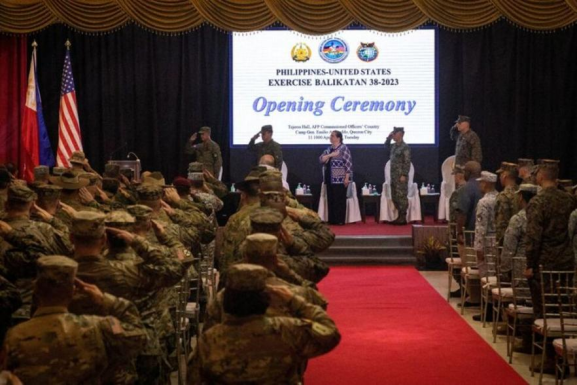RCAS Talk-The Large-scale US-Philippine Military Exercise Revealed Marcos Jr.’ Policy Adjustment toward China
Time: 2023-05-01 Author: RCAS
On April 11, the United States and the Philippines held a joint military exercise called “Balikatan”, which reached a record high between the two countries from participating forces to exercise subjects. This military exercise will last until April 28.

▲General view during the opening ceremony of the annual Philippines-U.S. joint military exercises or Balikatan, at the Armed Forces of the Philippines headquarters, in Quezon City, Metro Manila, Philippines, April 11, 2023. (REUTERS)
The exercise drew high attention from China as the Philippines and China have territorial disputes over the South China Sea and the Philippines is also the closest Southeast Asian country to the Taiwan Strait where a fierce competition was conducted between China and the United States.
Nian Peng, director of the Research Centre for Asian Studies (RCAS) in Haikou, China, said that this upgraded US-Philippine military exercise is a clear sign that the United States is preparing for the possible military conflicts in the future. The United States has exercised its ability to cooperate with its allies in a local conflict.
In a largely peaceful environment, why can military exercises stir up all countries?
“In fact, after the World War II, there is no real peace. Although there is no conflicts between great powers, proxy conflicts, regional conflicts and local conflicts come one after another.” Nian Peng explained that if a region already has territorial disputes and ideological opposition, military exercises will stimulate the security situation. And the most common purpose is to deter by force. This refers to showing strong force through military exercises to deter other countries from provoking disputes and suppressing their intentions.
“The signal transmitted by the military exercise is that the military cooperation between the United States and the Philippines has recovered from the stagnation of the Duterte era and developed very rapidly. This trend and speed have beyond China’s acceptable limits.” Peng said.
After 2000, the Philippine presidents had to face the relationship with China and the United States-the Philippines was once colonized by the US, so it had strong historical ties and strategic interests with the US; As a maritime neighbor, China may be extremely important for poverty reduction and economic development in the Philippines.
Benigno Aquino III, who was elected in 2010, initiated arbitration on sovereignty disputes in the South China Sea. In 2016, the Permanent Court of Arbitration in the Hague ruled that China lost the case, and China-Philippine relations dropped to a freezing point.
Duterte, who took office in 2016, took a very different path. He shelved disputes in the South China Sea and actively developed relations with Beijing. Duterte put forward “Build, Build, Build”, many of which were carried out under China’s “Belt and Road Initiative” (BRI). During his tenure, Duterte once suspended the important Visiting Forces Agreement with the United States.
Nian Peng said that in the Philippines, many scholars believe that Aquino III’s pro-American and anti-Chinese policy will not work, and Duterte’s alienation from the United States is also not feasible. But Marcos Jr., who just took office, has balanced the relations and moved closer to the United States without alienating China.
In January this year, besides ASEAN countries, Marcos Jr. chose China for his first visit. The two countries signed a joint statement saying that they agreed to establish direct communication channels between the foreign ministries on the South China Sea to peacefully handle disputes; China also promised to invest US $22.8 billion in the Philippines.
While escalating military cooperation with the United States, Marcos Jr. also emphasized that Philippine military bases accessible to the United States will not be used for any aggressive operations, and stressed that cooperation with Washington is aimed at enhancing Philippine defense capabilities. “If they don’t intend to attack us, they don’t have to worry because we won’t fight them.”
“But Marcos Jr. did not fully estimate that the military cooperation with the United States is the most sensitive to China and has a great impact on China-Philippine relations.” Peng added that the United States is constantly provoking China in the South China Sea and the Taiwan Strait, so China is extremely sensitive and worried about the purposeful military cooperation between its neighbors and the United States. When this negative emotion accumulates to a certain extent, it will be transmitted to bilateral relations and adversely affect the normal exchanges between the two countries, especially economic and trade cooperation.
In other words, for the Philippines, the balance between China and the United States is a “risky strategy”. Marcos needs to accurately control the small space between the upper limit of military cooperation with the United States and the bottom line acceptable to China. A slight carelessness may not be worth the loss.
The article was partially translated from the BBC Chinese News, https://www.bbc.com/zhongwen/simp/world-65345018.

